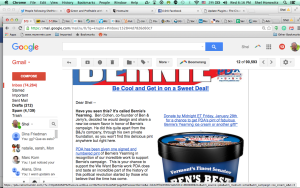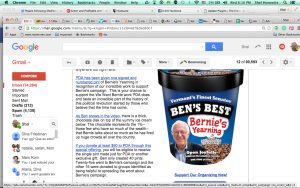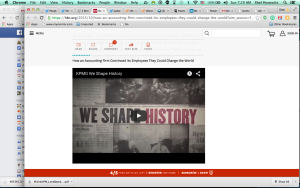Media Double Standard—And They Wonder Why We Don’t Trust Them
Here’s the opening paragraph from the Associated Press report on yesterday’s Wisconsin primaries:
MILWAUKEE (AP) — Republican Ted Cruz stormed to a commanding victory in Wisconsin Tuesday, denting front-runner Donald Trump’s chances of capturing the GOP nomination before the party’s convention. Democrat Bernie Sanders triumphed over Hillary Clinton but still faces a mathematically difficult path to the White House.
This is entirely too consistent with a long-running pattern in the mainstream media: anything that gets in the way of a Donald Trump nomination is heralded, even though the mainstream Republican Party loathes Ted Cruz—and I and many other progressives find his brand of religious extremism as much of a threat as Trump’s racism and misogyny. I’m sure they would rally much more happily around Kasich, if he could only get non-Ohioans to vote for him.

Yet the mainstream media continue to trivialize Sanders’ victories—in 7 of the last 8 contests—and talk about how difficult it will be for him to overcome Clinton’s delegate lead.
A more honest reportage would note that Trump and Cruz have swung wildly back and forth, neither emerging as a clear victor, and both wildly unpopular with mainstream voters.
It would also note these key differences in the Democratic race:
- Sanders has been remarkably consistent on issues for his entire adult life, going back to his days marching for civil rights with Martin Luther King; Clinton has changed positions frequently (moving left under pressure from Sanders in her rejection of the TPP trade partnership, embrace of same-sex marriage, and energy issues—even outflanking him from the left on guns
- Much of Clinton’s delegate strength is in “superdelegates” pledged to her, but not bound to her; this same group switched to Obama in ’08 and will switch again if Sanders enters the convention with a commanding lead among elected delegates, because they don’t want to give away the presidency to the scary and fractious Republicans
- The mainstream media continually says that Clinton does better with black voters and urban areas. Yet, some of the most highly urbanized and ethnically diverse states have gone for Sanders, especially Michigan, where a “close race” turned out to be huge for Sanders—and my own diverse, urbanized state of Massachusetts was a virtual tie (as were Iowa and several others)
- Clinton has consistently benefited from early voting, gaining tallied votes while Sanders gets his campaign warmed up, while same-day voters in several states have overwhelmingly supported Sanders; Daily Kos calls this “Hillary’s Surge Protector.”
- Clinton’s greatest strength has been in the conservative South—but those states aren’t likely to go blue in November; in likely Democratic states, Sanders has an enormous edge
So hey, AP, hey, New York Times [“Mr. Sanders’s win is so surprising that it’s hard to know what to make of it. Are we learning, for the first time, of a big latent advantage in the Rust Belt? Was it a fluke?”], hey, Washington Post [“Bernie Sanders may be drawing thousands of people to his rallies and raising millions of dollars online, but increasingly he’s also having to make the case that his campaign isn’t a lost cause.”], and hey, CNN [“Trump remains the Republican presidential front-runner, but he didn’t clean up on Saturday…Sanders still a thorn in Clinton’s side”]
—how about if you use the same standards to judge Sanders’ rapid ascent against Clinton as you to for the anyone-but-Trump pushback that has given legs to the Cruz campaign?







